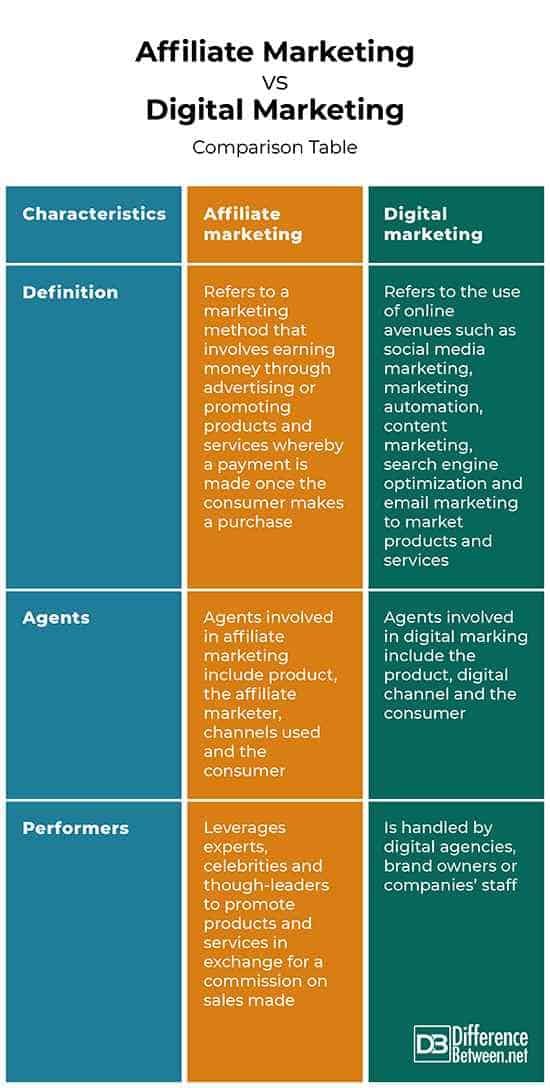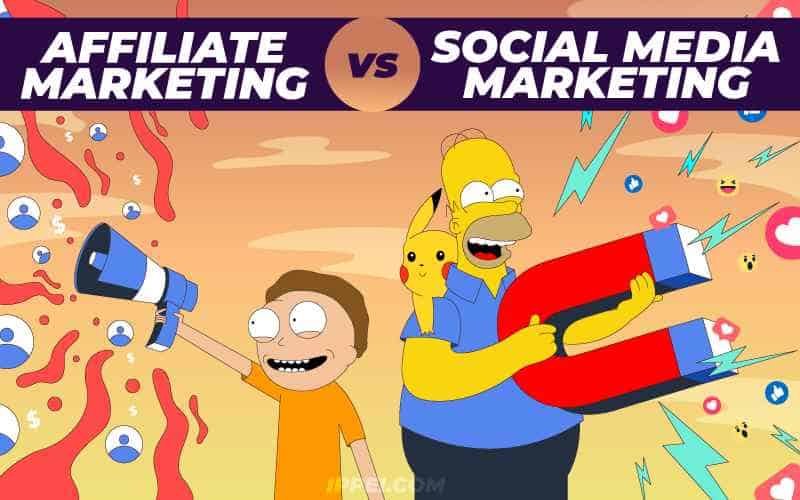In a world that is becoming more and more reliant on digital marketing, the debate over which advertising method is better, social media advertising or affiliate marketing, has been ongoing. Both methods have their advantages and drawbacks, and it can be challenging to determine which one is the best fit for your business. As a digital marketing expert, I have had the privilege of working with both forms of advertising and have gained a deep understanding of their nuances. In this article, we will dive into the intricacies of Social Media Advertising vs. Affiliate Marketing and help you decide which one is right for your marketing goals. So, buckle up and let’s get started!
Comparison Table: Social Media Advertising vs. Affiliate Marketing
Features
| Feature | Social Media Advertising | Affiliate Marketing |
|---|---|---|
| Targeting | Advanced targeting options available based on demographics, interests, and behavior | Relies on affiliates’ audience targeting and their ability to market effectively to that audience |
| Cost | Can be more expensive compared to affiliate marketing as it involves paying for ad space and clicks | Cost-effective as it involves paying affiliates only if they successfully generate a sale or lead |
| Control | Advertisers have complete control over the ad creation, targeting, and budget | Advertisers have limited control over the affiliates’ marketing techniques and need to trust them to follow guidelines |
| Conversion Rate | May have a lower conversion rate compared to affiliate marketing as it involves interrupting the user’s browsing experience with ads | Higher conversion rate as affiliates’ audience trusts their recommendations and may be more willing to purchase a product |
Specifications
Social Media Advertising
- Platforms: Facebook, Instagram, Twitter, LinkedIn, Snapchat, etc.
- Ad Formats: Image, Video, Carousel, Collection, Lead generation, Dynamic product ads, etc.
- Cost Model: CPM, CPC, CPA, etc.
- Tracking: Detailed tracking and reporting of ad performance
Affiliate Marketing
- Platforms: Affiliate networks such as CJ, ShareASale, etc.
- Marketing Tactics: Blogging, Influencer marketing, Email marketing, etc.
- Cost Model: Cost per Sale (CPS), Cost per Lead (CPL), etc.
- Tracking: Affiliate tracking software tracks referrals and commissions earned by affiliates

Social Media Advertising
Short Description
Social media advertising is a promotional technique that uses social networks to promote products or services to a target audience.
Pros
– Ability to target specific demographics
– Offers immediate results
– Great potential for high engagement and ROI
– Multiple ad formats available
Cons
– Can be costly for some businesses
– Requires constant attention and monitoring
– Ad fatigue is a common issue
– Limited control over platform algorithm changes
Key Points
– Social media advertising is a great way to reach a large audience quickly
– Offers detailed targeting options to ensure ads are shown to the right audience
– Multiple ad formats available, including image ads, video ads, sponsored posts, and more
– Can be customized and optimized for better results
Features
– Offers detailed targeting options
– Multiple ad formats available
– Provides analytics and insights
Quantitative Measurements and Research
– Facebook Ads: The average cost per click is $1.86. The average click-through rate is 0.90%.
– Instagram Ads: The average cost per click is $0.50. The average click-through rate is 0.80%.
– LinkedIn Ads: The average cost per click is $5.26. The average click-through rate is 0.39%.
Reasons to consider Social Media Advertising
– Great for businesses looking for immediate results
– Can be highly effective in reaching target demographics
– Provides detailed analytical insights that can improve ROI
Reasons to ignore Social Media Advertising
– May not be suited to small businesses or those on a tight budget
– Can be time-consuming to monitor and optimize regularly
– Can be affected by the platform algorithm changes that can decrease ROI
Affiliate Marketing
Short Description
Affiliate marketing is a performance-based type of marketing that rewards individuals or companies for driving traffic or sales to a brand’s website.
Pros
– Low initial investment
– Minimal effort required
– Offers passive income potential
– High potential for ROI
Cons
– May require time to find the right partners
– Revenue sharing involves giving up a portion of profits
– Limited control over affiliate partners’ tactics
– Can be difficult to track success and ROI
Key Points
– Affiliate marketing can be profitable with minimal investment or effort
– Offers a wide range of potential partner options
– Can be customized to fit in a variety of niches
– Provides passive income potential
Features
– Revenue-sharing model
– Offers a wide range of marketing tools
– Affiliate tracking links
Quantitative Measurements and Research
– The global affiliate marketing industry is worth $12 billion.
– 15% of the total digital media advertising revenue is from affiliate marketing.
– 81% of brands use an affiliate marketing program.
Reasons to consider Affiliate Marketing
– Low investment required to start
– Offers passive income potential
– Great for those in niche markets with loyal followings
Reasons to ignore Affiliate Marketing
– Can be difficult to track success and ROI
– Requires trust and transparency with affiliate partners
– May not be suited for businesses with a limited product range or broad audience appeal
Conclusion
Both social media advertising and affiliate marketing have their advantages and disadvantages, and the best choice will depend on your business’s needs, goals, and budget. Social media advertising is an excellent option for businesses looking for a quick way to reach a large audience, while affiliate marketing offers passive income potential and requires minimal time investment. Regardless of the chosen method, it’s essential to set clear goals, measure success, and continually optimize for better results.

Guidelines for Using Social Media Advertising vs. Affiliate Marketing: Which is Better?
1. Identify your target audience
Before deciding which approach to take, consider your target audience. Are they more likely to respond to social media ads or affiliate marketing?
2. Set clear goals
Regardless of the approach you choose, it’s important to set clear goals and metrics to measure success. This will help you determine which approach is more effective for your business.
3. Understand the costs and potential ROI
Both social media advertising and affiliate marketing require an investment. Calculate the costs associated with each approach and weigh them against potential return on investment (ROI).
How To Determine your Goals for Social Media Advertising and Affiliate Marketing
1. What should you consider when choosing between social media advertising and affiliate marketing?
When choosing between social media advertising and affiliate marketing, you need to consider several factors such as your budget, audience, industry, and marketing goals. Determine which method will better achieve your goals and match your audience’s preferences and behaviors.
2. How do you define your target audience for social media advertising or affiliate marketing?
Defining your target audience is crucial to the success of your social media advertising or affiliate marketing campaign. Use your existing customer data to create detailed profiles for your target audience, including their browsing habits, demographics, interests, and behaviors.
How To Create and Execute Your Social Media Advertising and Affiliate Marketing Campaign
3. How do you create an effective social media advertising campaign?
To create an effective social media advertising campaign, you should start by identifying your goals, defining your target audience, selecting the right social media platform(s), creating high-quality content, setting your budget, monitoring and optimizing your campaign, and measuring your results.
4. How do you build an affiliate marketing campaign?
To build an affiliate marketing campaign, you need to select a reliable affiliate network, identify your target audience, choose an attractive commission structure, provide affiliates with high-quality promotional materials, monitor affiliate activity, and optimize your campaign to increase conversions and revenue.
How To Measure and Analyze the ROI of Your Social Media Advertising and Affiliate Marketing
5. How do you measure and analyze the ROI of your social media advertising or affiliate marketing campaign?
To measure and analyze the ROI of your social media advertising or affiliate marketing campaign, you need to track your key performance indicators (e.g., clicks, conversions, sales, revenue), calculate your cost per action (CPA), compare your campaigns against each other, and use analytics tools to gain insights into your audience’s behavior and preferences. Based on your analysis, adjust your campaigns to optimize your ROI.
Frequently Asked Questions
1. What is social media advertising?
Social media advertising is the process of using social media platforms to promote products or services. Advertisers set up paid advertising campaigns on social media platforms to reach a specific audience and achieve their marketing goals.
2. What is affiliate marketing?
Affiliate marketing is a type of marketing where a business pays a commission to an affiliate for each customer brought to the business through their promotional efforts. Affiliates can promote the business through various channels, including social media, blog posts, and email marketing.
3. Which is better, social media advertising or affiliate marketing?
It depends on your marketing goals and target audience. If you are looking to reach a large audience quickly and increase brand visibility, social media advertising might be the better option for you. On the other hand, if you are looking to generate more sales or leads, affiliate marketing could be the better choice.
4. What are the benefits of social media advertising?
Some benefits of social media advertising include the ability to target specific audiences, real-time tracking of campaign performance, and the ability to reach a larger audience quickly. Social media advertising can also be cost-effective compared to traditional advertising methods.
5. What are the benefits of affiliate marketing?
Some benefits of affiliate marketing include the ability to increase brand awareness, generate more leads and sales, and build relationships with affiliates. Affiliate marketing can also be cost-effective, as businesses only pay affiliates when they generate a sale or lead.
In conclusion, both social media advertising and affiliate marketing present unique benefits and challenges to businesses looking to expand their reach and increase sales. Social media advertising offers a wider audience and more control over ad placement and targeting, while affiliate marketing allows for a more personal and relationship-based approach to marketing.
It ultimately depends on the goals and resources of the business which method will work best for them. However, regardless of the chosen strategy, it is important to stay up-to-date with trends and data to effectively reach and engage with the target audience.
In the end, a combination of both social media advertising and affiliate marketing may be the most effective approach for businesses to maximize their ROI and establish a strong online presence. By prioritizing audience engagement and a strong brand identity, businesses can take advantage of these two powerful marketing tools to succeed in today’s digital landscape.